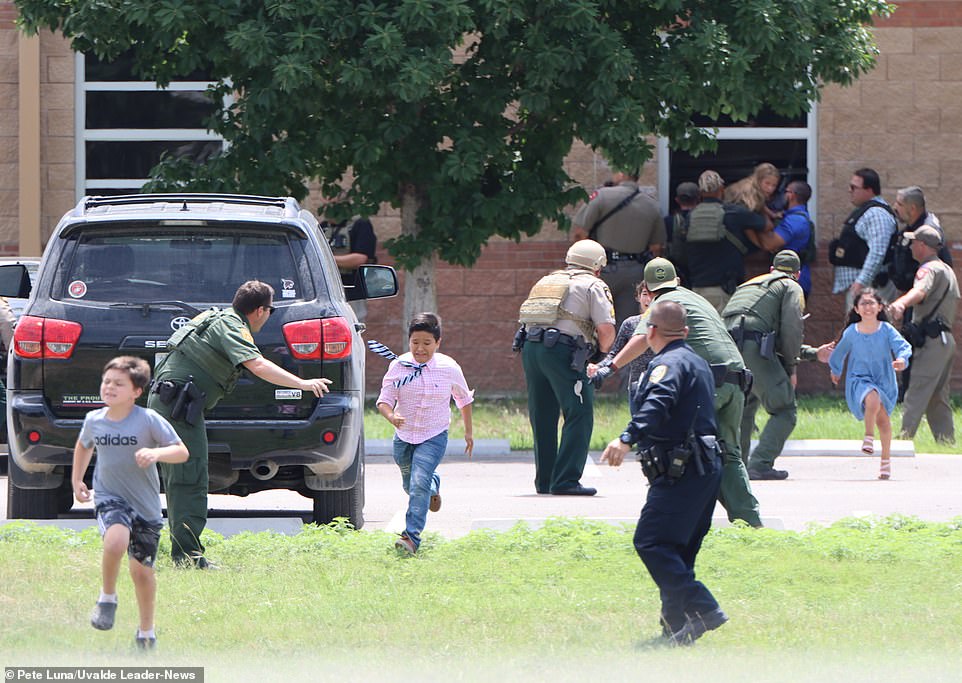
Nobody seems to know what to do with it all.
By now, you have no doubt heard the same details I have, facts that make the atrocious murder of 19 children and their two teachers somehow much worse. That the police did not realize there were children still alive and trapped in the classroom with the shooter while they waited. That those children called 911, begging operators to send help. That one child smeared another child’s blood on herself and played dead. That at least one frantic mother ran into the school to find her child.
Like every parent in America, I grappled with that last thought–of the parents, assembled at the little elementary school, despairing, separated from their children while the scene remained active.
Like every parent in America, I saw the photos of the children online, saw the little boy with his tie on–it was awards day–running, terrified, and transposed my own son’s face upon his.
Like every parent in America, I kissed my children goodbye, sending them off for their last week of school, taking extra time to deeply inhale the scent at the crowns of their heads, my nose pressed warmly against their hair.
Every Memorial Day, we pause at the cusp of summer’s glory to give thanks to those who lost their lives for our freedom. This year, the devastating realization: we are counting dead school children among those who died in part because we as a people have tied ourselves to the idea that liberty must be secured by porous legal frameworks that grant 18 year-olds easy access to weapons capable of enormous destruction.
It feels absurd to make this connection, that a federal holiday created to remember the heroism and sacrifice of wartime dead might somehow also apply to fourth graders murdered en masse the week before summer break. But now we speak of elementary schools in wartime language, comparing them to “targets” that need to be “hardened.” This is who we are.
We are a people–a great people–so bitterly divided that we default to the stalemate of inaction in the face of such tragedy. We blame a propped-open door, we blame a mental health crisis, we blame God, we blame the poor police officers overwhelmed by an unbrokered evil that had never before visited their town. And we blame the guns. But we do not, not all of us, blame all of these things together. So we do nothing further than argue and rage.
This week I visited the little Baptist church on the edge of the university campus where I work. It was Pentecost Sunday, which is admittedly an interesting day in the church calendar. Pentecost marks the story of how the apostles were gathered fifty days after the resurrection, when a thunderous noise came down and it looked as if the apostles had all caught themselves on fire, and they began speaking in foreign languages.
The people around them naturally noticed all of this fire and babbling, and they were predictably unsure just what was happening. One part of the crowd could not help but ask aloud, “what does this mean?” Another part was mostly convinced the apostles were drunk, even though it was early in the morning.
The Apostle Peter eventually realizes the onlookers have grown into a large crowd, stands up, and proclaims the holiness of Jesus Christ as God and savior. The Book of Acts says three thousand people heard Peter’s message and were cut to the heart. They repented and were baptized. It was important to note the apostles’ new language capacity because it enabled them to speak the Gospel to foreign tribes. This mass conversion is generally considered the birth of the Christian church (and also sort of explains, in case you were wondering, why St. Peter’s Basilica is named after, well, Peter).
If you know me well, you know I am a reluctant evangelist, and all this about Pentecost isn’t a sly attempt to convert you via blog post.
Friends, we aren’t speaking the same language much anymore. And to my own dismay, not even the anguish of losing 19 children to a raging gunman cuts to our hearts and snaps our thinking into focus.
Christianity does not promise personal comfort, world peace, or national unity. It is not a fast-track to kumbaya. It offers exactly one safe harbor in the form of salvation, but even eternal life is couched in death.
That isn’t a means of excusing murder or condoning inaction. And it’s at this point in this silly, futile rambling essay that I throw my hands up and wonder why bother.
At the heart of Memorial Day, I believe we see a holy connection between Christ’s sacrificial death and those brave men and women who stormed beaches fighting for what we thought was right. The beautiful elementary students who died because we refuse to forswear even an inch of our right to keep and bear arms ought to cut us to the heart. But it doesn’t. At least, not deeply enough.
When I was younger in my faith, I came to understand how some in my religion used fear as a weapon: fear of hell, fear of God’s wrath, and so forth. The Book of Revelation, when read through a lens of fear, becomes a conspiracy-laden cipher of end times crazy enough to spook most all of us.
But as I grow older in my faith, Revelation begins to resemble more a relief from the madness we’re thickly baked into. There will be accountability, though. As Tony Woodlief wrote last week,
We are tempted to blame God for his absence, but we tremble at the thought of what he’s going to do when he returns. What will he say, when he sees the mess we’ve made of things? Where are my children? he will ask. Sweet Christ, who’s going to be the one to tell him?
There’s no turning this into something happy or cheerful or hopeful. Not when we are surrounded by tombstones. All we can utter is come quickly, Lord.






Catherine Carter
Amen. And so it is.